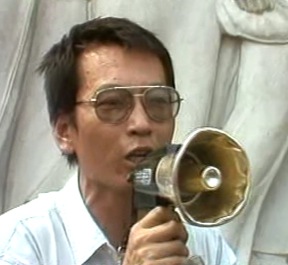
Related pages: Video clips from The Gate of Heavenly Peace | That Holy Word, "Revolution" | Key Characters
 A literary critic and lecturer at Beijing
Normal University, Liu Xiaobo became one of the most prominent and acerbic
cultural figures in China in the late 1980s. In 1989, he was a visiting fellow at Columbia University in New York City when he decided to return to China and take part in the popular movement. (View an excerpt from The Gate of Heavenly Peace for more about Liu's decision to return.) He initiated the four-man hunger strike on June 2nd (view an excerpt from the film; click on the link for Hunger Strike), and called on both the government and the students to abandon the ideology of class struggle and to adopt a new kind of political culture. Liu was jailed for 21 months after June 4th and has not been allowed to publish anything in China since 1989.
A literary critic and lecturer at Beijing
Normal University, Liu Xiaobo became one of the most prominent and acerbic
cultural figures in China in the late 1980s. In 1989, he was a visiting fellow at Columbia University in New York City when he decided to return to China and take part in the popular movement. (View an excerpt from The Gate of Heavenly Peace for more about Liu's decision to return.) He initiated the four-man hunger strike on June 2nd (view an excerpt from the film; click on the link for Hunger Strike), and called on both the government and the students to abandon the ideology of class struggle and to adopt a new kind of political culture. Liu was jailed for 21 months after June 4th and has not been allowed to publish anything in China since 1989. In May 1995, Liu Xiaobo was detained by the Chinese authorities for organizing a new petition campaign on the eve of the sixth anniversary of June 4th, calling on the government to reassess the protest movement and to initiate political reform. In October 1996, Liu Xiaobo was sentenced to three years in a labor camp for co-authoring a petition critical of the government.
In December 2008, Liu, along with over three hundred other Chinese intellectuals and activists, signed Charter 08, a document calling for political reform in China. The next day, Liu Xiaobo was detained by Chinese police and held under "residential surveillance". On June 23, 2009, Liu was formally arrested on charges of "suspicion of incitement to subvert state power." (See BBC News, Voice of America, and Human Rights in China for more information.) On December 25, 2009, following a trial that lasted under three hours (Human Rights Watch: "Liu Xiaobo's Trial a Travesty of Justice"), Liu was sentenced to eleven years in prison. (See "Chinese dissident's jailing draws international anger," BBC; "International outcry after Chinese dissident Liu Xiaobo sentenced to 11 years," Times Online"; and Leading China Dissident Gets 11-Year Term for Subversion," The New York Times.) Read Liu Xiaobo's "I Have No Enemies: My Final Statement" - written on December 23, 2009, the day of his trial.
Liu Xiaobo filed an appeal on January 28, 2010, charging the trial
court with "an abuse of public power." (See Human Rights in China for the full defense
statement.) In a New York Review of Books blog ("What Beijing Fears Most"), the China scholar Perry
Link comments that "Liu's response to his sentence - and that of a
number of Chinese intellectuals over the past few weeks - suggests that
the Charter 08 movement continues to survive, despite extraordinary
efforts by the Chinese government to repress it." Liu's appeal was denied.
In October 2010, Liu Xiaobo was awarded the 2010 Nobel Peace Prize for "his long and nonviolent struggle for fundamental human rights in China." With Liu imprisoned in China, his absence at the December 10, 2010 Nobel Peace Prize ceremony was symbolized by an empty chair. The actress Liv Ullmann read Liu's statement, "I Have No Enemies: My Final Statement," which includes the lines:
Hatred can rot away at a person's intelligence and conscience. Enemy mentality will poison the spirit of a nation, incite cruel mortal struggles, destroy a society's tolerance and humanity, and hinder a nation's progress toward freedom and democracy. That is why I hope to be able to transcend my personal experiences as I look upon our nation's development and social change, to counter the regime's hostility with utmost goodwill, and to dispel hatred with love.
Liu Xiaobo passed away on July 13, 2017, while still in state custody.
Related sites and links:
Related topics:
In a 2006 article entitled "The Internet is God's Present to China" (reprinted by The Times, April 28, 2009), Liu writes, "The internet has made it easier to obtain information, contact the outside world and submit articles to overseas media. It is like a super-engine that makes my writing spring out of a well. The internet is an information channel that the Chinese dictators cannot fully censor, allowing people to speak and communicate, and it offers a platform for spontaneous organisation." In a related article, "Bibliomania in Sino-cyberspace," Gloria Davies (China Heritage Quarterly, No. 13, March 2008) notes that "although mainland cyber-bibliothèques have no difficulty in featuring the 'collected works' (wenji) of prominent mainland-based scholars such as Liu Xiaofeng, Qian Liqun, Wang Hui, Xu Jilin and Zhu Xueqin, they are generally prevented from housing the writings of distinguished dissident or dissenting intellectuals such as Dai Qing, Wang Lixiong and Liu Xiaobo, who have been banned from publishing within China. Thus, their writings, housed in cyberspace beyond the confines of China's Great Firewall, are largely inaccessible to the mainland reading public."